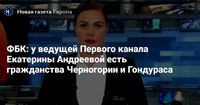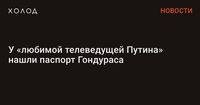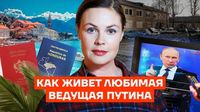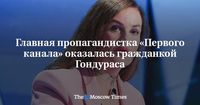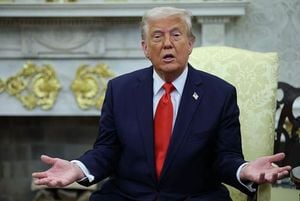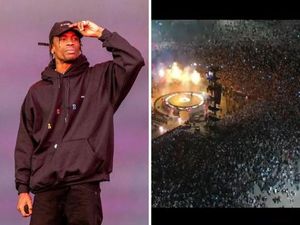Ekaterina Andreeva, a prominent news presenter on Channel One, has come under scrutiny for her ability to travel freely across Europe, thanks to her dual citizenship in Honduras and Montenegro. This revelation comes from an investigation by the Anti-Corruption Foundation (FBK), which highlighted the discrepancies between her public persona and her private life.
Andreeva, often referred to as "Vladimir Putin's favorite presenter," has been a fixture on Russian television since 1995 and has hosted the main news program, "Vremya," for nearly three decades. Despite the ongoing conflict in Ukraine, which has seen many Russians restricted from traveling abroad, Andreeva has continued to visit several European countries, including Finland, Norway, and Montenegro.
The investigation revealed that Andreeva acquired her Honduran citizenship on November 27, 2005, as documented in a power of attorney published by the FBK. This document also confirmed her passport details, raising questions about how a key figure in Russian military propaganda can enjoy such freedoms while others face significant travel restrictions.
According to the FBK, Andreeva received her Montenegrin passport in 2011, granted to her for "special services to the country." This honorary citizenship is typically awarded to individuals whose professions and status are deemed particularly important to Montenegro. Investigators noted that her husband, Dushko Perovich, who holds citizenship in Serbia and Montenegro, has been instrumental in her obtaining this passport.
FBK representative Georgy Alburov expressed concerns over Andreeva's travels during a time of war, stating, "It is abnormal that during the three years of war, one of the main faces of military propaganda travels the world and presents herself as an apolitical travel blogger." The investigation pointed out that since the onset of Russia's full-scale invasion of Ukraine, Andreeva has made trips to several NATO countries, raising eyebrows given her role in promoting state propaganda.
In addition to her travels, Andreeva has been active on social media, sharing images from her vacations in Montenegro, particularly from the resort town of Sveti-Stefan, where her husband owns a private home. This has led to accusations of hypocrisy, as she often criticizes these very countries on her broadcasts.
Following the publication of the FBK's findings, Maria Pevchikh, the chairman of the board of directors at FBK, announced plans to appeal to the Montenegrin government to revoke Andreeva's citizenship. Pevchikh questioned the legitimacy of the citizenship granted to Andreeva, stating, "For what merits was it issued, and why does the main propagandist of Putin need a passport from a NATO country?"
FBK's legal head, Vyacheslav Gimadi, explained that under Montenegrin law, citizenship can be revoked if the behavior of an "especially important citizen" causes serious damage to the vital interests of the country. With international sanctions already imposed against Andreeva by Canada and Ukraine, the FBK is pushing for similar actions from other nations, citing her role in state propaganda.
Andreeva's husband, Dushko Perovich, has his own controversial background. He has been linked to lobbying efforts for pro-Russian leaders and has faced sanctions from the United States for his activities. The FBK investigation also revealed that Perovich has been involved in questionable financial dealings, including payments made to Andreeva's daughter from a previous marriage for a car rental that appears excessively priced.
As the investigation continues to unfold, the implications of Andreeva's dual citizenship and her travels raise significant questions about the accountability of Russian state media figures. Critics argue that it is unacceptable for someone who actively participates in spreading state propaganda to enjoy the freedoms that many ordinary Russians are denied.
Andreeva's case is emblematic of the broader issues surrounding Russian media, where state-controlled narratives often clash with the realities faced by the populace. As the war in Ukraine persists, the role of media figures like Andreeva in shaping public perception and their ability to travel freely will likely remain a contentious topic.
In summary, Ekaterina Andreeva's dual citizenship and her ability to travel freely in Europe amidst ongoing conflict raise serious ethical questions about the responsibilities of public figures in times of war. As investigations continue, the FBK and other organizations are calling for greater scrutiny and accountability for those who promote state propaganda while enjoying privileges denied to many.


